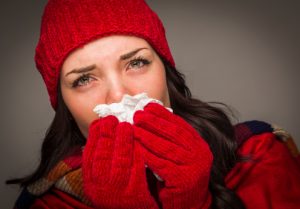 Environment Canada is calling for a warmer winter, which translates to less illness for the population. Above seasonal temperatures could mean Canadians will be less sick because the flu is more likely to spread in colder temperatures. Dr. Wajid Ahmed, associate medical officer for Windsor-Essex County Health Unit, said, “Every time the temperature is getting down, which is meaning the temperature is getting colder, the virus’s ability to survive in that environment increases. If the temperatures are milder, then it goes in the opposite direction and viruses don’t tend to survive longer in the environment.”
Environment Canada is calling for a warmer winter, which translates to less illness for the population. Above seasonal temperatures could mean Canadians will be less sick because the flu is more likely to spread in colder temperatures. Dr. Wajid Ahmed, associate medical officer for Windsor-Essex County Health Unit, said, “Every time the temperature is getting down, which is meaning the temperature is getting colder, the virus’s ability to survive in that environment increases. If the temperatures are milder, then it goes in the opposite direction and viruses don’t tend to survive longer in the environment.”
Although warmer temperatures play a role in the spread of the flu, other factors could counteract the warm temperature advantage. It has been shown that in warmer weather people tend to be more careless when it comes to hygiene – a large factor in the spreading of the flu. Dr. Ahmed explained, “Human behavior is the most important. If it’s warmer weather…then they tend to be a little bit careless in their own personal behavior that can lead to the spread of the bug in the community.”
Advertisement
Furthermore, warmer weather means people will be heading out more to public areas, such as shopping malls and parties, thus bringing large groups together in close quarters, which makes it easier for germs to spread quickly.
Although the temperature may be an advantage to slowing down the spread of the flu, experts suggests that human behavior will trump warm weather, thus causing the virus to continue spreading. Pharmacist Timothy Brady said, “It doesn’t really have as much to do with the viruses. When the weather’s a bit nicer, you’re more apt to go around and actually mingle with other people. And because of that, with people not taking precautions among other things, they’re usually more prone to spread colds.”
If you want to avoid catching or spreading the flu this [warmer] winter season, try these tips:
- Wash your hands frequently.
- Cough or sneeze in the crook of your arm, not your hand.
- Avoid touching your eyes, nose or mouth.
- Clean and disinfect objects touched by many people.
- Maintain a healthy lifestyle with good food and regular exercise.
- Get plenty of rest.
- If you do get sick, stay home to avoid spreading your germs.
- Get the flu shot.
Also read: Winter heart attack risk increases in the cold weather
Influenza (flu) risks in winter, earlier outbreaks, outlook for 2015-16 season
Source:
http://www.cbc.ca/news/canada/windsor/warm-winter-influenza
